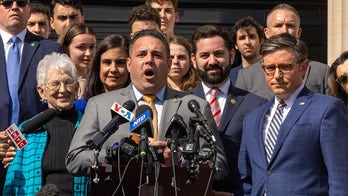SAN ANTONIO -- The budget gap faced by state governments has totaled more than $527 billion since 2007, forcing lawmakers to slash state spending nationwide, according to data released Tuesday at the National Conference for State Legislatures.
When drafting budgets for the upcoming year - and in some states the next two years - lawmakers forecast slow to moderate economic growth and expect to make fewer cuts. But that was before the recent political turmoil over the debt ceiling, a precipitous drop in the stock market and the downgrading of government bonds.
Analysts predict lawmakers will face budget shortfalls totaling $89 billion in 2012, less than the $145 billion shortfall they faced in 2011.
"If you look at how states have dealt with this, it has primarily not been through tax increases, but primarily through budget cuts or, over the last few years, through the use of federal stimulus dollars," said Arturo Perez, director of the fiscal affairs program for the conference. "There has been a net $2.3 billion tax decrease."
In some cases, lawmakers allowed temporary tax hikes to expire, Perez said. Other significant trends included reducing business taxes while removing exemptions and credits and raising tax assessments on health care providers.
The National Conference of State Legislatures is a bipartisan organization that serves legislators and their staffs by providing research, expertise and holding conferences. This year's national meeting was being held in San Antonio.
State lawmakers made their budget forecasts before the recent economic turbulence and Tuesday's announcement by the Federal Reserve that it was revising downward its forecast for economic growth in the United States. In a survey of state officials who work on the budgets, slower than expected economic growth was the biggest concern over whether states would meet their revenue forecasts, and therefore avoid additional budget cuts.
On Tuesday, California State Controller John Chiang said July's personal income, sales and corporate taxes were 10 percent below projections, creating a nearly $539 million shortfall. The result will push the state closer to automatic, mid-year budget cuts to schools, universities and social services.
Experts also expressed concern over cuts in federal entitlement programs that could create additional problems for the states. Michael Bird, senior federal affairs counsel for the organization, said every report he's reviewed that seeks to find cost savings for the federal budget calls for cutting Medicaid, which would hurt states by forcing local authorities to pay for indigent health care that the federal government currently covers.
"If you save money at the federal level, you have just shifted a whole, big pile of costs down to state governments and counties," Bird said.
Texas has already shorted funding for Medicaid by $4.8 billion by expecting faster economic growth and federal permission to spend less on the joint federal-state program, which provides care for the poor and disabled. North Carolina and Massachusetts also depend on Medicaid cost-savings for to avoid future budget problems.
Hospitals are required by law to provide emergency care, so when Medicaid doesn't cover the cost local taxpayers pick up the bill.
State officials also reported concern over state employee retirement systems, court challenges to their budgets and increasing health care costs.
Overall, though, state revenues have been growing as the economy has improved since the recession ended in June 2009. Perez said state revenues usually take 12 to 24 months to recover following a recession, and the current indicators project state revenues will continue to rise slowly.




